CCE Media Fellows
Bridges of Cross-Cultural Understanding: Professor Yumi Takahashi's Civic Engagement Through the Multicultural Lens.
.jpg) Yumi Takahashi in the middle together with her students during the field trip in the Issyk-Kul region.
Yumi Takahashi in the middle together with her students during the field trip in the Issyk-Kul region.
Yumi Takahashi came to Kyrgyzstan bringing with herself Japanese philosophies and eagerness for civic engagement through academia and cultural education. Students and faculty know Takahashi because if they hear someone speaking Japanese on campus, she is definitely a part of this conversation. However, she became an “unspoken ambassador of Japanese culture” because she founded the Japanese club, which became a little Japan in the heart of the Kyrgyz university.
Previously living in Japan, Europe and USA, it seems that there was a special reason for coming to Central Asia. It has been nine years since she came here and underwent the journey from a Master’s student to a professor of classes related to Japanese culture and religion, multicultural societies, and cross-cultural communications.
However, Takahashi does an excellent job not only as a faculty member but also as a strong civic engagement activist. Recently Takahashi received a grant from the Center for Civic Engagement at the American University of Central Asia to implement initiatives that help local youth to enhance their understanding of active civil society.
Takahashi implemented an initiative where AUCA students in collaboration with leaders of AUCA Japanese club had an opportunity to enhance their understanding of Global Citizenship Education. Ten students from the "International Development and Cross-Cultural Communication" course taught by Takahashi deepened their knowledge of the significance of GCED through the exploration and engagement of the One Village One Product (OVOP) rural development project.
OVOP, a project initiated through the Japan International Cooperation Agency (JICA), reached Kyrgyzstan in 2011 aiming to revitalize the region and rebuild communities by creating specialty products using ingredients unique to the mountainous country. With the help of the project, more than 2700 people have stable jobs in the Issyk-Kul region and 90% of them are women according to the Japan International Cooperation Agency.
“The majority of producers are women, and the ability to earn money has contributed to their empowerment,” said JICA. “A sense of community has also grown through their collaborative work.”
Firstly, students gained theoretical knowledge within the classroom walls and learned about women's empowerment, SDGs, issues of gender, and explored the necessary values for building an inclusive, secure, and sustainable world.
Then, students together with Takahashi went to the Issyk-Kul region in October 2023 to observe the Kyrgyz OVOP Model workshops and interact with the local community. They got a great chance to visit small-scale local producer’s workplaces and the OVOP's new building for the food products section, dyeing station, and office.
After the fieldwork, students started applying their new knowledge into practice and created three study groups. Each of them focused on the following topics: "Empowerment of Women through Business in the Villages of the Issyk-Kul Region," "Sustainable Development Goals," and "Alternative Paradigm of Development."
Seeing how the program works and understanding the strength of GCED in real life was possible because of the strong educational approaches of Takahashi. She does an excellent job in prioritizing practical knowledge in her educational approaches. It is crucial for students to prepare for real-world challenges and deepen their abilities to analyze the needs of local communities beyond theoretical understanding.
Personal Motivation and Philosophy
When Yumi Takahashi talks about her culture, she seems to be the happiest person in the building because she joyfully laughs, explains things with trepidation and always smiles.
“I am the only Japanese professor in the university and I was wondering how I can give back to the community through my uniqueness,” explained Takahashi. “I always thought about what I can do that other people can't.”
However, another reason for her efforts to promote Japanese culture is way deeper than it seems. Takahashi once mentioned that she feels the strongest pride when her students go to study in Japan and feels sad if some of them end up not there.
“Japan is aging and facing depopulation issues. That is why now Japan wants to attract more foreigners to the country and make Japanese people coexist with different cultures,” said Takahashi. “That is why I want to become a bridge between my country and Kyrgyzstan.”
Behind the huge work on cultural education hides the strong identity and love for the home country of Japan. It turns out that a Japanese club and teaching Japanese culture is a way for Takahashi to help her motherland deal with a pressing problem while being thousands of miles away from it.
.jpg) Yumi Takahashi with the students.
Yumi Takahashi with the students.
It shows the ability of Takahashi’s long-term thinking, which is in fact the part not only of her philosophy but also her classes.
“Long-term thinking means not to repeat previous mistakes,” said Takahashi. “It is about knowing what we should do in the future if something happens.”
It feels like long-term thinking is indeed a huge part of Japanese philosophy, which is also part of Kyrgyz or Central Asian perspectives that needs to be reinforced. Takahashi shared that Japan faced many earthquakes and tsunamis, which heavily affected the country and its people.
Japanese people have the mentality of preparing themselves for the future a lot, it really puts them on the frontline in responding to urgent disaster crises. Takahashi possesses the quality of resilience, which is her inner core and tool of inner self-understanding. This way of thinking connects to another Takahashi’s philosophy of “Kaizen”, which is the philosophy of continuous improvement and belief that people should keep changing and advancing.
With the recent earthquake in our country that put a lot of stress on Kyrgyzstanis there is definitely a lot to be learned from the Japanese disaster hazard mitigation.
Students and Their Values
Takahashi mentioned that she loves Kyrgyz students because of their multicultural views on the world.
“Kyrgyz students can listen,” said Takahashi. “They speak several languages, they know so many cultures and they listen even if the information is not new for them.”
One of the missions of Takahashi is helping students to find their core values and spread them as responsible members of society. One of the students shared that Takahashi “inspires us to be energetic or stay calm even during challenging times.” It is indeed the aura that comes from Takahashi. The aura of calmness and energy above anything else.
Takahashi believes that Kyrgyz students have strong capabilities to adapt and advance in Japan. One of her students, Alibek Murataliev, received a prestigious Japanese government scholarship MEXT and now studies in Japan.
“I want to educate Kyrgyz students about the culture in Japan before they go there,” said Takahashi. “Students are the center of my life.”
.jpg) Yumi Takahashi and the students representing the Japanese Delegation during Multicultural Week.
Yumi Takahashi and the students representing the Japanese Delegation during Multicultural Week.
Alibek Murataluev shared that Takahashi played a pivotal role during his undergraduate studies and beyond.
“Out of the many great qualities that Yumi Takahashi has, I appreciate her endless desire to help the youth and the new generation the most,” said Alibek. She is always ready to give advice or suggest the opportunity if you ask her for it. On top of that, she will never cross the boundaries of interpersonal relationships and be always respectful to people. I have many times appreciated her support and respect that she gave to me and always noticed how she treats other students with respect and not as students, but as fellow colleagues.”
Takahashi’s ability to inspire students to aim for more and become persistent seems to be one of her strongest professional and personal qualities.
“She's very active and never sits still,” shared Aidaana Khasanova, the current leader of the Japanese club. “She's always in search of different opportunities for learning and growing and different collaborations. I'm learning a lot from her to be more active.”
Core Values
Takahashi brings a strong sense of collectivity to the community of AUCA and beyond. She creates an inclusive space where students have the opportunity to find their core values. Values that later on become their fuel for active engagement in the community. She strongly believes in the significance of the open society because it allows people to communicate, prevent conflicts and coexist with each other harmoniously.
“Civic Engagement is the bridge to community,” said Takahashi. “It is about growing and developing myself, about walking together as the future community.”
Takahashi is a bright representative of her culture who dedicates herself fully to forming a bridge between the two nations with different cultures. She values humanity, unity, respect, and understanding. She holds a strong Japanese identity but also has a multicultural perspective of the world where cultural intelligence lays the foundation for the betterment of society.
The article was prepared by Salima Almazbekova, junior student from JMC department
Student Civic Engagement: A Pathway to Active Citizenship
Civic engagement refers to the active participation of citizens in activities that help to strengthen the society, bring changes for the betterment of the community and address social, economic, and political issues. Each person can become an active citizen however civic engagement among university students is a cornerstone of the thriving community as they represent the future generation of leaders. When students implement social projects, they feel a strong sense of community and a necessity to bring changes with far-reaching implications. However, how do students from different countries with challenges such as authoritarianism, lack of quality education, economic constraints and external, political influences take initiative on civic engagement projects with a huge impact? We discover the stories of active students of the American University of Central Asia from Afghanistan, Kyrgyzstan, Uzbekistan, Tajikistan and Kazakhstan who have been successful in addressing the issues that matter most to them for deep and personal reasons.
Zainab Amirzai, senior student, Afghanistan
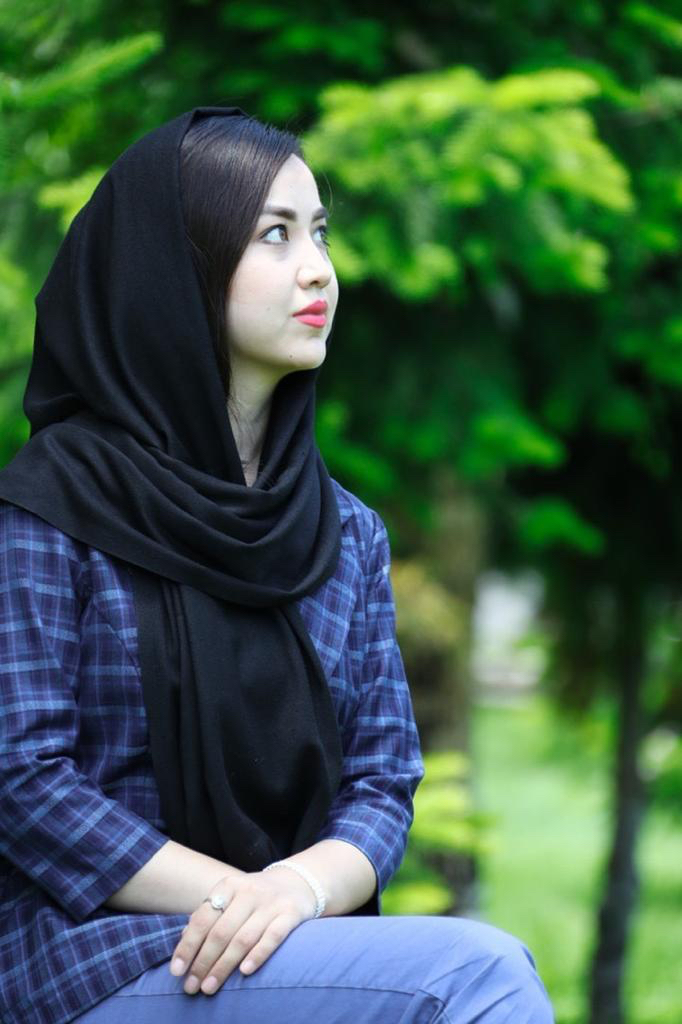
Zainab Amirzai.
Zainab Amirzai, a senior student of the American University of Central Asia from Afghanistan, was leading a civic engagement project which researched the lives of Afghan immigrants in Kyrgyzstan. After the Taliban seized control in Afghanistan, many Afghan families were forced to leave their homeland, move to different countries and adapt in new environments. Zainab and her teammates interviewed Afghan families living in Osh and Bishkek cities to know more about the challenges they face every day in the new country. The final outcome of the project was presented in the form of the documentary and academic journal article.
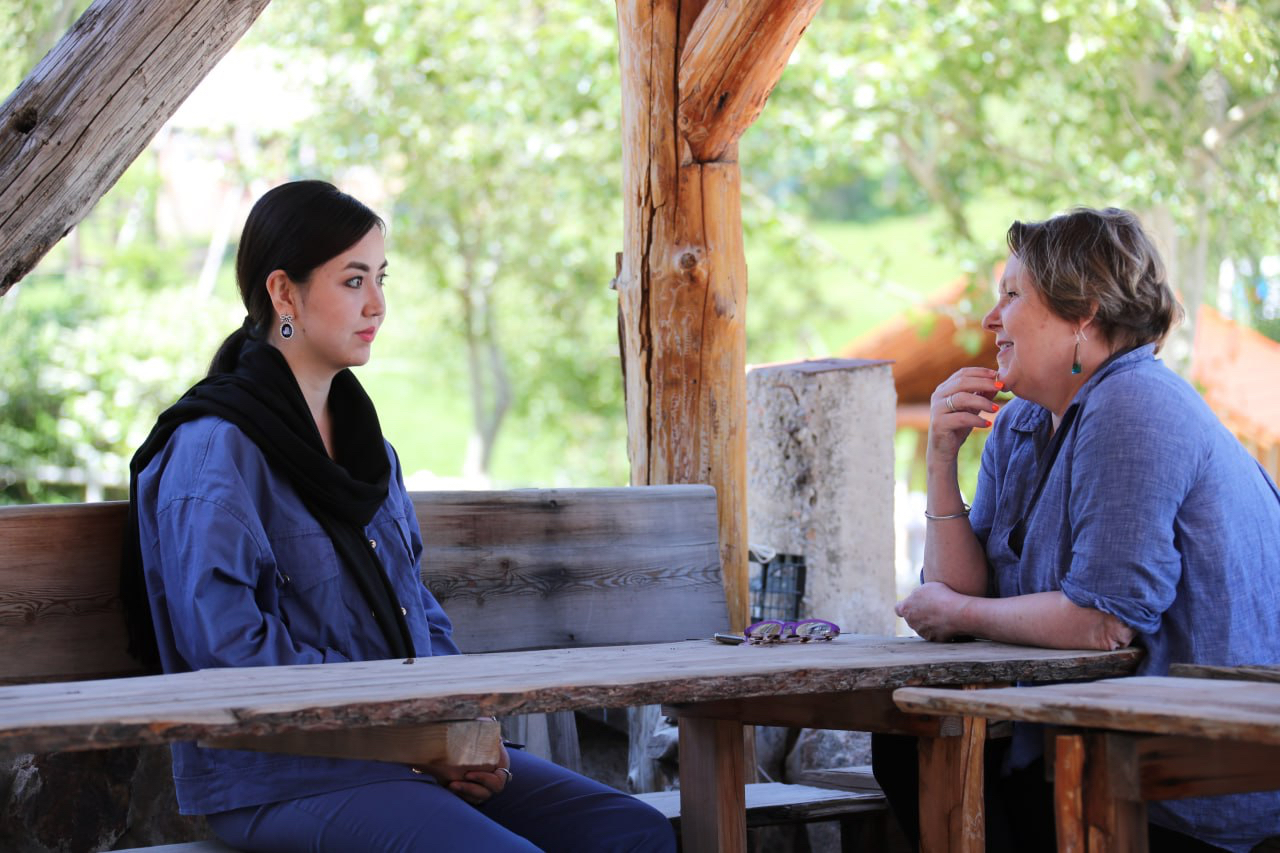
Zainab Amirzai on the left.
Zainab shares that civic engagement for her is not just a concept but a responsibility and privilege to actively participate in the society, speak on issues that matter and be part of the bridge between the citizens and the government while reflecting the collective will. She believes that civic engagement helps her to foster her leadership and management skills, learn how to easily adapt to new environments and overcome different challenges. Civic engagement for her is not only about big projects but also about kindness and willingness to give back to the people around.
“Being a part of civic engagement activities is a social responsibility, does not matter how big or small your action is, every action counts. It could be volunteering in different organizations, helping your group mates with assignments, helping elderly people – every action counts”, says Zainab.
Zainab feels like she is a civically active citizen because through her projects she builds a strong connection with the community and contributes to the most pressing issues.
Masuma Makhamadalieva, senior student, Uzbekistan
Masuma Makhamadalieva.
Masuma Makhamadalieva from Uzbekistan is a senior student of the Television, Cinema, and Media Arts department at AUCA. Together with Zainab, Masuma was also researching the lives of Afghan refugees in Kyrgyzstan. In the project, she worked as a camera operator and translator during the interviews of each member of different Afghan families residing in Osh and Bishkek cities.
Civic engagement for Masuma is a sense of duty to analyze the problems that make society suffer and find different outcomes that can contribute to the solutions to these problems. Masuma believes that civic engagement is especially important for young people because they are becoming strong members of society with great opportunities to share their knowledge and benefits with those who need it most.
Masuma shares that before the project, she did not fully realize the depth of Afghan immigrants’ struggles, she was shocked to hear stories of daily discrimination cases. Through the documentary, Masuma and her teammates hope to reach out to the authorities who can help Afghan people with different issues like the inability to recover their passports.
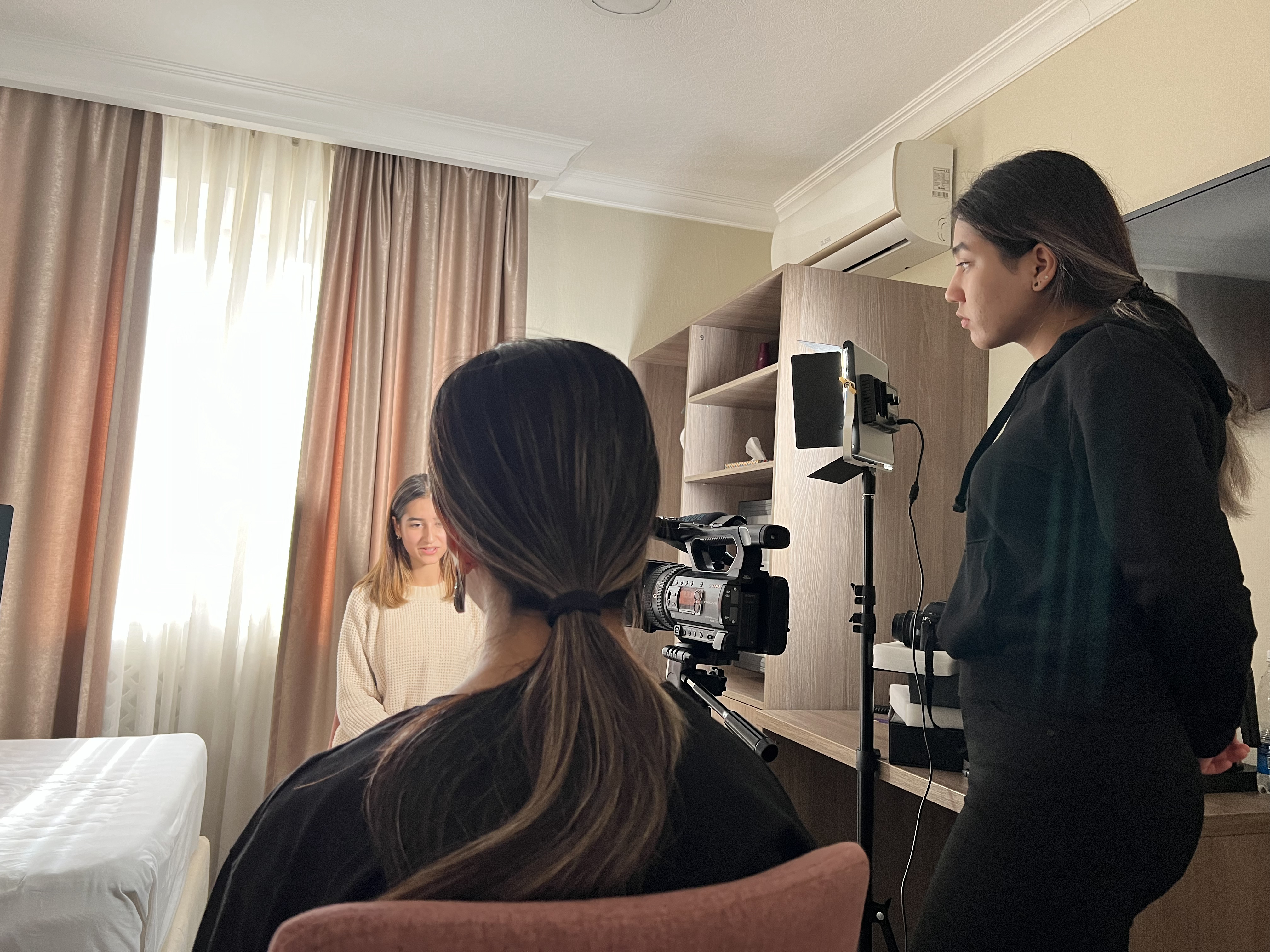
Masuma Makhamadalieva is taking an interview during the project.
Masuma also feels a strong connection and necessity to bring change in her home country. She feels a strong sense of civic responsibility and believes that through her projects, she can address the issues that matter to her.
“I am a student from Uzbekistan and there are a lot of social problems and the biggest one is a problem with education. Not everyone has access to quality education and as a privileged girl from Uzbekistan, I have a strong sense of duty to help my community and show the youth all the opportunities they have. That is why civic engagement is vital because it is a way through which I can do that,” says Masuma.
Saliya Khurova, senior student, representative of the Dungan minority in Central Asia, originally from Kazakhstan
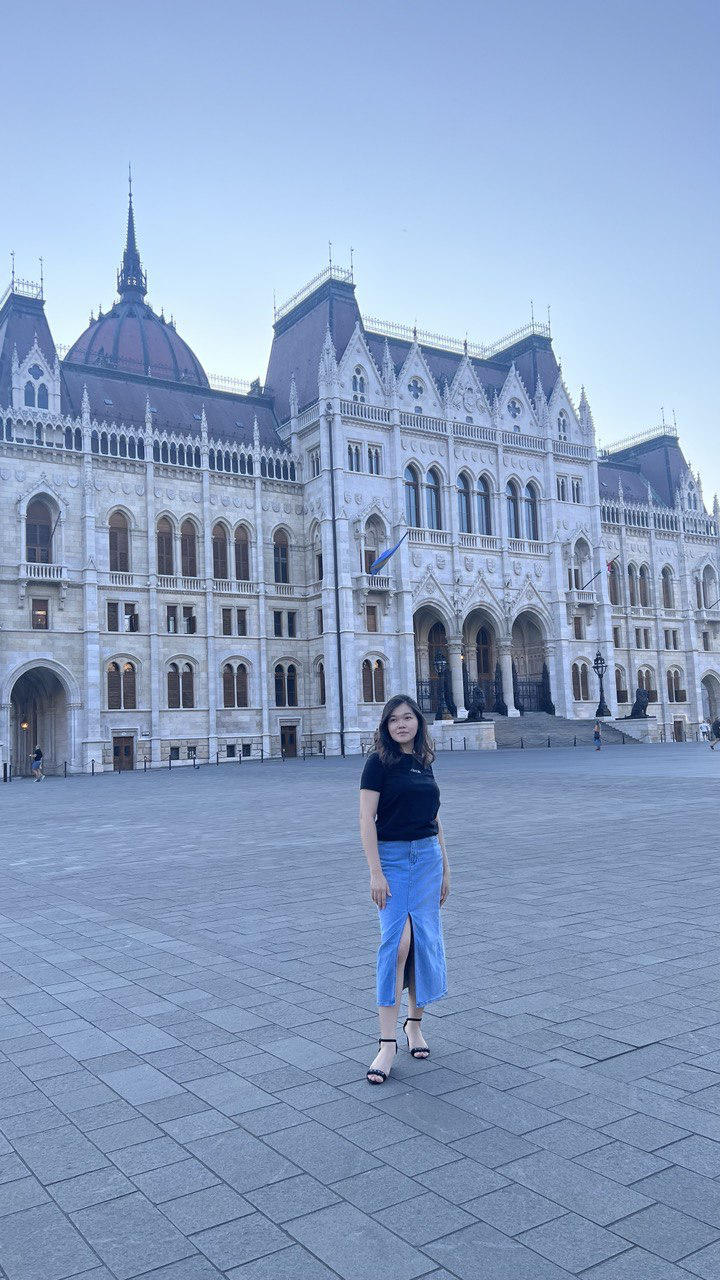
Saliya Khurova.
Saliya Khurova, a senior student of the Journalism and Mass Communication department, is a representative of the Dungan minority in Central Asia and is originally from Kazakhstan. Saliya was a UNICEF volunteer, a president of the AUCA volunteering club and a project manager of the “Basketball for All” civic engagement project.
Civic engagement for Saliya is more than just an activity, it is one of the most important parts of her life as she not only helps the community but also tributes the memory of the close person and reaches a strong personal growth through her commitment to civic engagement.
Behind the interest in engaging in the “Basketball for All” which is a project for creating an inclusive world for children with disabilities and other diseases was Saliya’s grandfather. He was a doctor and spent half of his life treating children with disabilities, autism, down syndrome and other neurological diseases.
“During COVID 19, he passed away and he could not see my success in this project. Everything I did was in memory of him and I imagined what he would say to me and how proud he would be,” says Saliya.
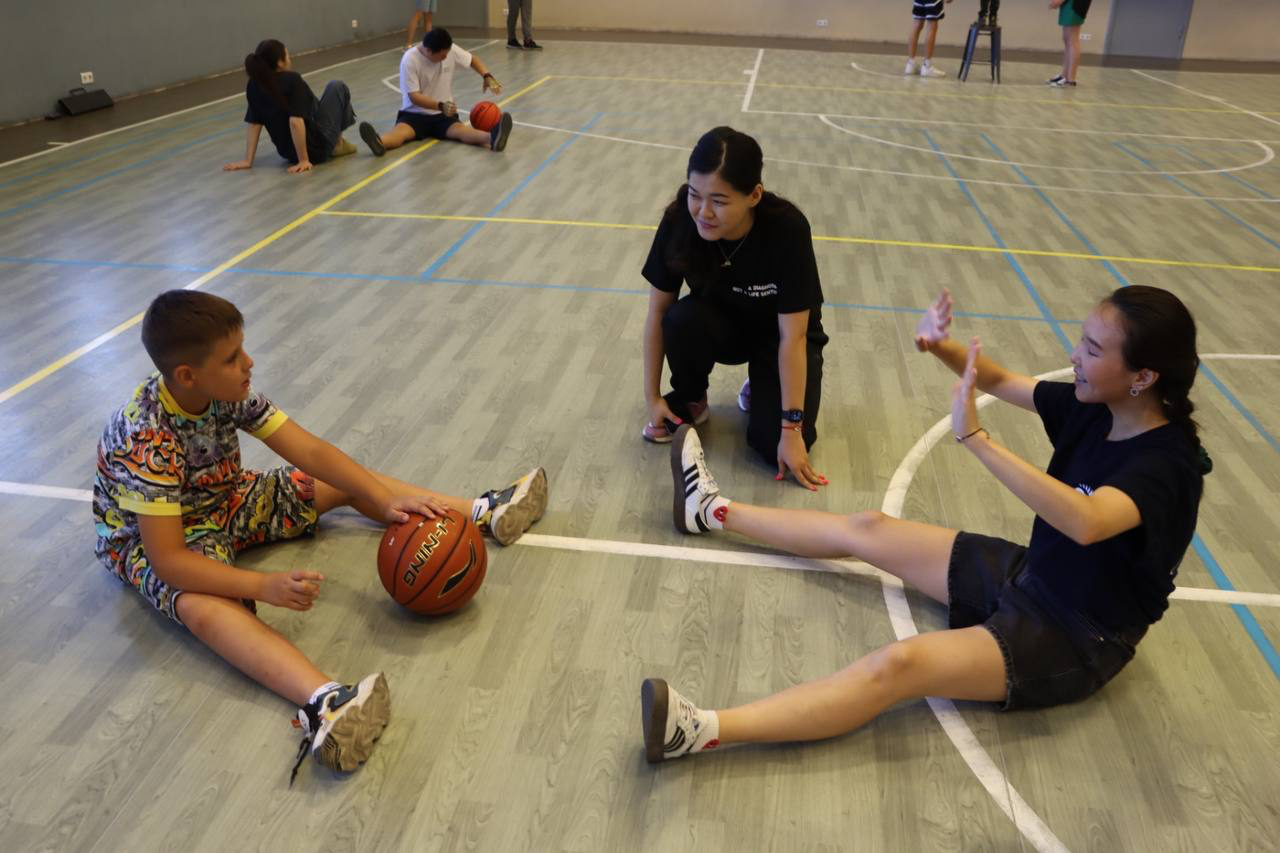
Saliya Khurova during the “Basketball for All” project.
Saliya shares that civic engagement greatly contributes to personal growth as she learnt how to lead projects, organize events, conduct negotiations and work with financi онal papers. At the beginning Saliya had a fear of public speaking and she was worried about time management, however as she says, “I could do it all, so less fear, more love, just do what your heart tells you to do”. Saliya advises everyone who wants to begin their civic engagement journey to never be afraid of asking for help, manage time wisely and work only on something you are passionate about.
Saliya is also proud to be a civic engagement activist and represents her minority.
“As a representative of the Dungan minority of Central Asia, I am really proud that I could take leading positions in different projects. I really want other Dungan boys and girls to follow my steps, take the lead, and take the initiative for civic engagement projects. I want them to understand that they are also capable of taking responsibilities of being leaders and still take actions even being a part of the minority.”
Nurbolot Piridinov, sophomore student, Kyrgyzstan
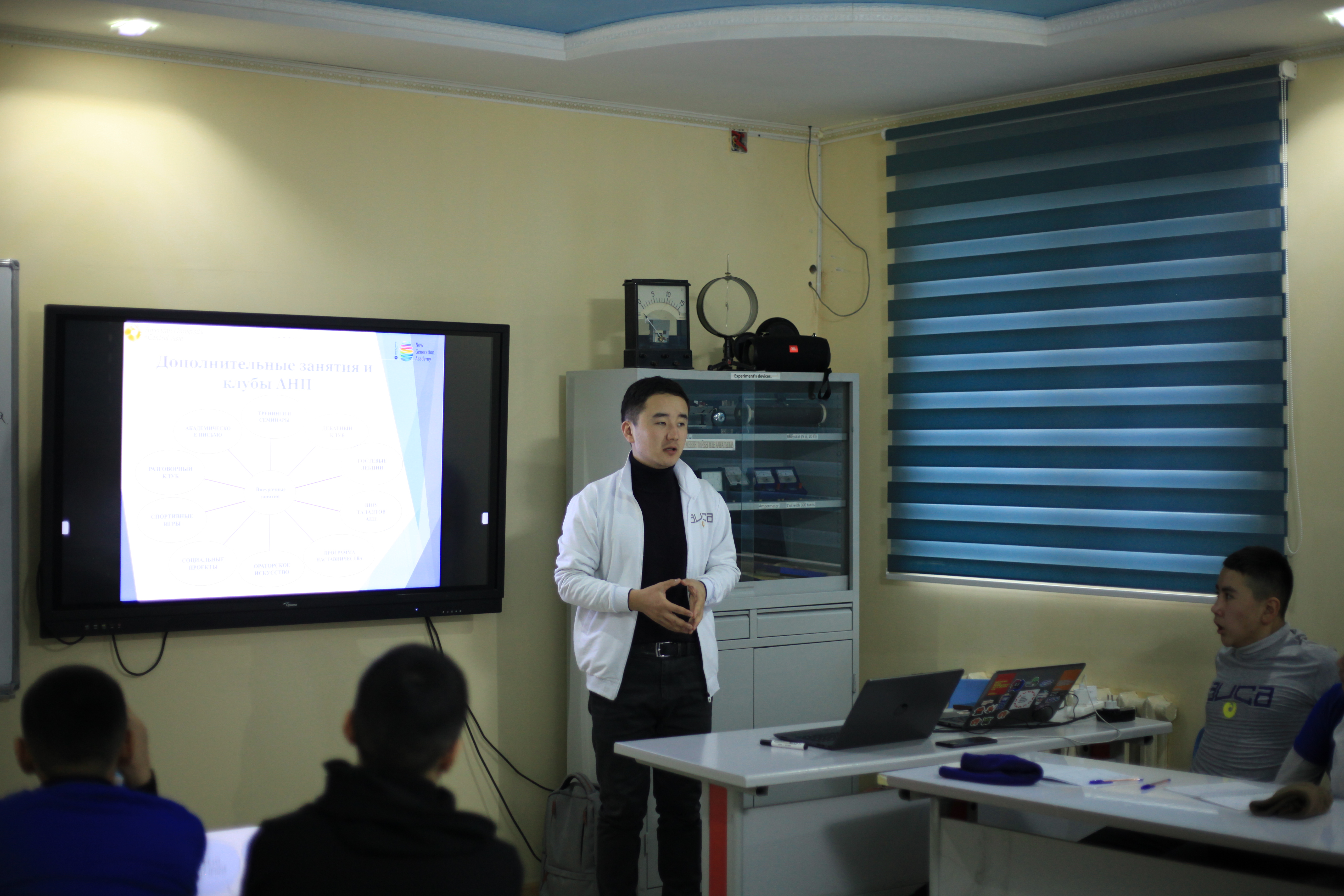
Nurbolot Piridinov.
Nurbolot Piridinov from Kyrgyzstan is a sophomore student of the software engineering department at AUCA. Nurbolot started his civic engagement journey when he was studying at the New Generation Academy where he engaged in different projects and realized the specific issues he wanted to address in the future projects. Nurbolot became passionate about helping high school students in the Batken region where he is originally from. He implemented several projects which were focusing on education as for example the “Digital Literacy” project where Nurbolot and his team were teaching high school teachers in Batken how to use digital tools.
Civic engagement for Nurbolot is a chance to make a difference in the field of education which he started to analyze and observe in high school. He shares the moment after which he realized that he wanted to connect his projects to the issue of low education in his home region.
“Civic Engagement for me is to help others, especially high school students. As a resident of the Batken region, I know that the level of education is low there because after graduation many students from my school went to Moscow to work as immigrants there. It was very sad for me and I felt that I wanted to help them. After that, I realized that I want to show high school students the opportunities of education and how education can help them in reaching their goals. I want them to recognize the significance of education in their lives. They can become good citizens and a good example for each other. I want to be a role model for them,” says Nurbolot.

Nurbolot Piridinov during the “Digital Literacy” project in Batken region.
Nigina Zoidboeva, freshman student, Tajikistan
.png)
Nigina Zoiddboeva.
Nigina Zoidboeva, a freshman student from Tajikistan is a founder of the “She can” project which helps girls from Central Asia in applying for exchange programs abroad.
Civic engagement for Nigina means being an active citizen and as for university students it is an opportunity to get real world experience and develop soft skills. She also believes that while engaging in civic engagement, it is important to build a good network of people with the same values and interests as you. For example, during her exchange year in the United States of America she met many people from around the world with whom they still support each other despite the distance. Nigina also finds civic engagement as a chance to help her home country and her community.
“For me, as for the Tajik girl, civic engagement is helping girls from my hometown in order to get a better education and study abroad. Even if right now I am away from home, I am trying to organize different conferences and online workshops for them. I am telling them about US exchange programs, about studying at AUCA and I also assist them during the application process. Civic engagement means providing education for girls in Tajikistan,” says Nigina.
She also shares the fears she had at the beginning of her journey and how she overcame them.
“Being engaged in social projects requires you to communicate with people a lot. At the beginning, I did not have good communication skills. That is why when I would approach someone to help, I was really shy and it was a big challenge for me. To overcome this, I realized that I need to be more confident. When I started doing this, I realized how many people are interested in my projects and how many people are willing to help me. I advise everyone not to be afraid to approach people and ask them for help and collaboration.”
.jpg)
Nigina Zoiddboeva.
—--
The engagement of these inspirational young leaders extends far beyond the classroom and leaves a huge impact on different communities. Student civic engagement is not just about society but also about the journey of self-discovery. It fosters critical thinking, problem solving and leadership abilities while also enhancing the values of responsibility, justice and social consciousness. Zainab, Masuma, Saliya, Nurbolot and Nigina have chosen to apply their learning to real-world challenges and address the issues that matter to them personally. It is important to note that each student, regardless of age or circumstance, has the potential to make a difference and become a civic engagement leader.
***********
Social isolation and exclusion are concepts that many people in our society are uninformed about and unfamiliar with. Unfortunately, one group of people in our country is forced not only to become familiar with this concept, but also to live in this isolation since birth. People with disabilities, people with cerebral palsy, or any other forms of special needs in our country are almost completely isolated from society and usually experience a lack of voice, lack of recognition, and lack of opportunities for equal and active participation in any field of work or education. Is it possible for a country to develop when thousands of its citizens are excluded from society?
The opposite concept of social isolation is social inclusion. In an inclusive society all citizens of the country, despite their social identities, such as age, gender, race, ethnicity, culture, or language, or their physical, economic, and social disadvantages, have equal opportunities to participate in civic, social, economic, and political activities.
Unfortunately, inclusivity is not fully present in Kyrgyzstan’s political or education systems, job market, or sports organizations, and it is never a subject of discussion among children at kindergartens, schools, or families. However, we still have a lot of opportunities to make our contribution to the development of an inclusive society in Kyrgyzstan.
We talked with one of the most hard-working, progressive, and truly intelligent women in our society, Seinep Dyikanbaeva to identify the roots of the social isolation issue, understand the concept of social inclusivity, learn about people with disabilities or cerebral palsy, and analyze the possible solutions.
Seinep Dyikanbaeva is a lawyer and an office manager for the Public Organization of parents of children with disabilities “ARDI.” She works for the promotion and realization of the rights of children with disabilities and their families. As a legal expert, Seinep does legal analysis, monitors important cases, and fights for inclusive education and integration of people with disabilities into society. As a person with cerebral palsy, Seinep understands the significance of social cohesion and inclusion.
Seinep’s childhood, issues in education
In her childhood, Seinep first studied at the rehabilitation center “Umut Nadezhda” because children with disabilities could not attend regular schools or kindergartens at that time. However, Seinep could fight the system and started to study at regular school number 27 where her teacher, Ludmila Aleksandrovna, prepared children to welcome Seinep to the class. Seinep never faced any academic difficulties while studying at the regular school and she had supportive relationships with her classmates.
“Nothing is better than a regular school, especially for children with disabilities. I still remember my feelings when I came to my school. I was the happiest person in the world. That is why, I do not agree that children with disabilities or those who have special educational needs should be separated in correction classes, boarding or home schools.”
By raising the issue of inclusive education, Seinep emphasizes the importance of giving children with disabilities equal opportunities to get an education in regular schools. She explains that based on previous cases, people with disabilities who received an education in a usual school became more successful later in life. It happens because from early childhood they were not isolated from society as are many other children with disabilities. Instead they were placed in an environment where they could learn necessary skills that are important for personal development.
Seinep mentioned the significance of the government’s participation in integrating inclusive education in Kyrgyzstan:
“Therefore, we need to develop the Department of inclusive education at the Ministry of Education in Kyrgyzstan. Only one person who works on inclusive education cannot develop a good inclusive educational system that will be integrated into the regular education system.”
After school, Seinep started her undergraduate studies at the Bishkek State University, however later she decided to turn her dreams into reality and worked hard to become a student at AUCA. Despite various challenges Seinep faced from a difficult application process to struggles with complicated assignments, she has quickly improved her grades and successfully received her bachelor’s degree in International and Business Law. Most of all, Seinep is grateful to her professors, who treated her like everyone else, expressing their respect rather than pity. Studying at AUCA helped Seinep to expand her knowledge and gain a strong foundation for her future career as a lawyer.
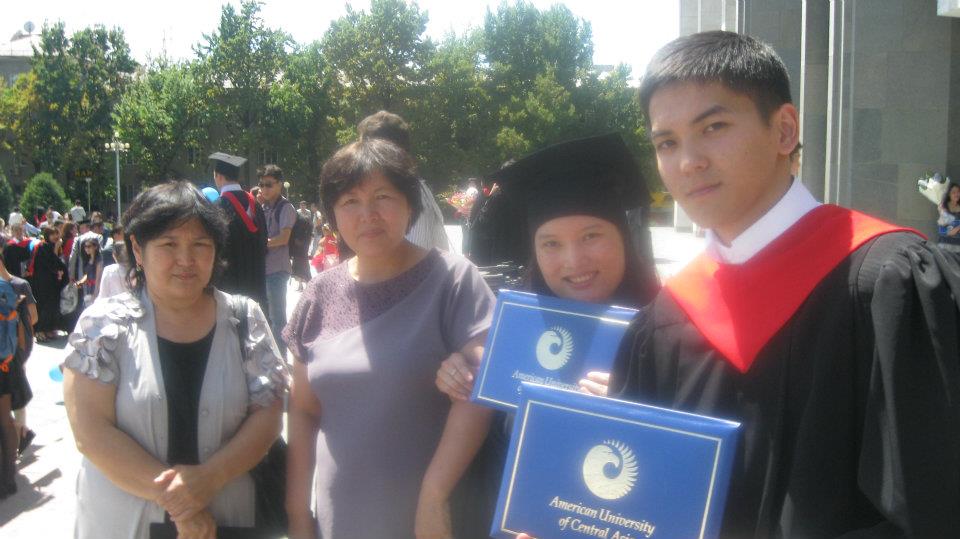
Seinep’s AUCA graduation
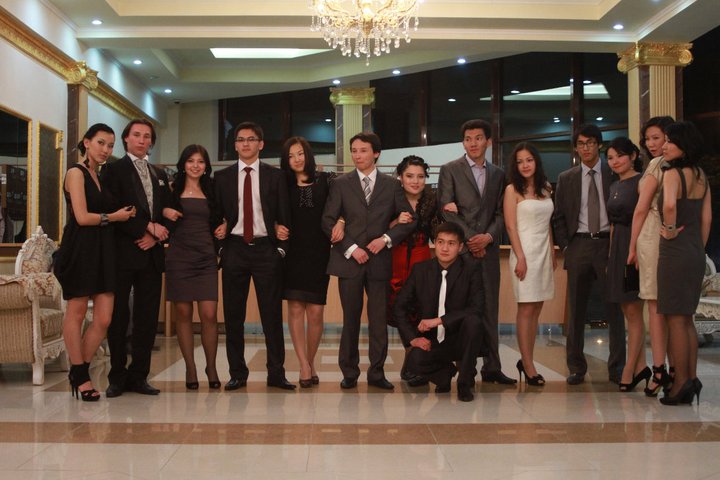
Seinep with her AUCA groupmates
Inclusive society in our country
Navigating the dialogue toward the question of an inclusive society, we identified that for the past twenty years, inclusivity in Kyrgyzstan has increased, however, there are still too many difficulties and issues which do not let us call our community inclusive. Despite the absence of necessary urban facilities and problems in the education system, people with disabilities started to face new challenges. Because of the lack of understanding of the concept of inclusion in our society, many citizens treat people with special needs with a sense of pity and a constant desire to help. However, it is worth noting that the biggest wish of people with disabilities is that they be treated the same as everyone else, even if sometimes their appearance is a little bit different. Seinep shares that she often does not know how to respond to unsolicited financial help from strangers on the street.
“Strangers approach me and offer money, taxi drivers often do not want to take my payments for the ride because of my condition. I call a taxi and I pay for it because it is a service. You give me service and I pay for it. If you want to be a charitable person, please go to the hospitals or provide it only to those who ask for this. As a lawyer and human rights defender, I stand for secular principles and equality. But on the other side, I do not want to offend a person who wants to be kind and do good. I do not know how to react when strangers offer me money. Should I react as a lawyer or as a human?,” asks Seynep.
The problem of insufficient awareness about people with disabilities
Inclusivity is not fully present in our education system, job market, and sports and it is never a subject of discussion among children at kindergartens, schools, or families. Parents tell their kids not to look at people with disabilities in public spaces, strangers usually never start conversations with them and the attitude of people immediately changes once the situation is known. That is why people with disabilities in our country are isolated from society and often treated very differently instead of being an equal part of the population. As nobody raised this topic at schools or universities, we decided to raise awareness about it now and ask how we should treat people with disabilities. The main idea of Seinep’s answer was that we should always treat everyone the way we want to be treated.
People with disabilities “want to be treated with respect, love, care, and all kinds of good feelings. All people want the same things, they want to be valued. Yes, we are a little bit different from most of the people but we still want to be treated with respect. Why is it a problem for regular people to build communication with people with disabilities? Because we have discrimination stigmas in our heads, therefore we need to forget about those disabilities. Even a person with a disability should forget about it,” explains Seynep.
Seinep also shares that being informed is not enough to be an inclusive person, it is vital to also have experience with different kinds of people and learn from those experiences even if they did not go well. Seinep understood it after one of the conferences she attended in the USA when a guy from one of the Central Asian countries with whom she just met did not change in any way when he saw Seinep’s situation. He continued their conversation as before and accompanied Seinep when she was leaving.
“I was so amazed, it was very interesting. I felt myself with this person as just a girl, just as a human being. He is well educated and intelligent which made me understand that to treat people properly, we should be educated and have experience with different kinds of people from early childhood,” says Seinep.
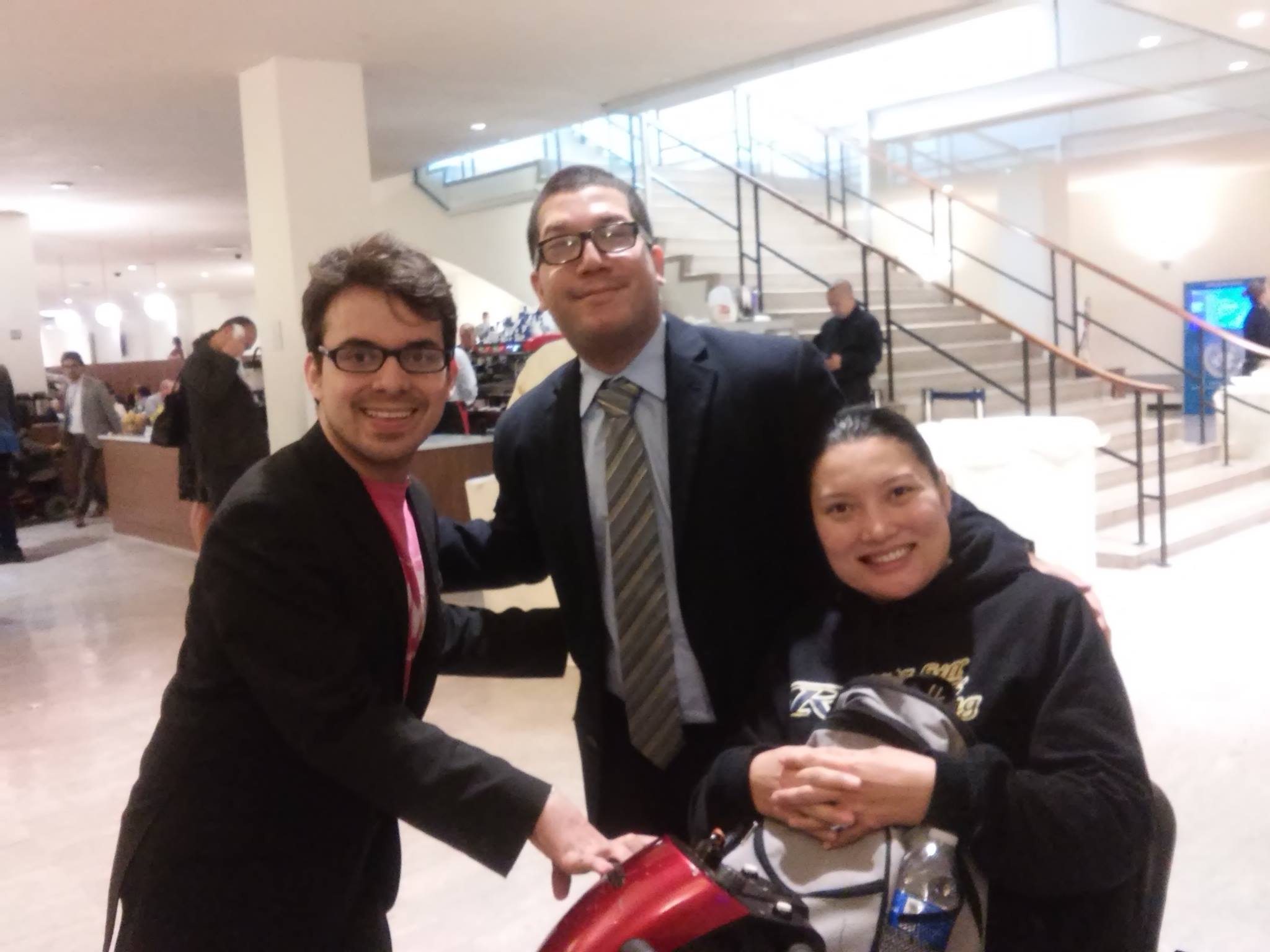
Seinep at the conference
Comparison with other countries
Changing the attitude of our society is a long and challenging process, however, if everyone will try to work on the stereotypes in their heads or try to communicate with different people, huge progress is possible. Another integral part of finding the solution to societal issues is to compare and analyze as Seinep did during her many trips to different countries. She shared that during her trip to Japan in 1999, she noticed that they have all the facilities for people with disabilities but the society itself does not accept them. While in Finland and USA, she was amazed by the way people are united and nobody ever treats you differently.
“I saw the differences in Finland and wanted to bring their best conditions back to Kyrgyzstan. I could not make big changes because the situation at that time was very bad but it was still good progress. When you start from a zero, you need to break through the strong ground. It took a long time and many years to break incorrect stereotypes. But even one person can bring change,” says Seinep.
Seinep also shares that we do not have enough people who fight for human rights, equality, and accessibility but she hopes that the number of progressive representatives of the society will be increased soon and she hopes it will happen in her lifetime.
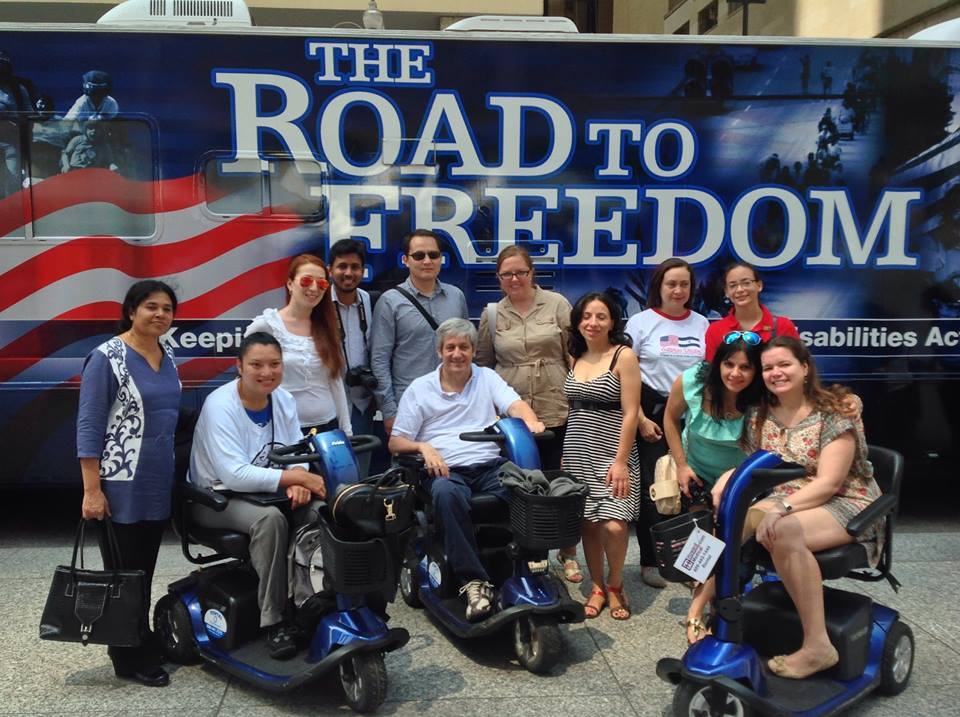
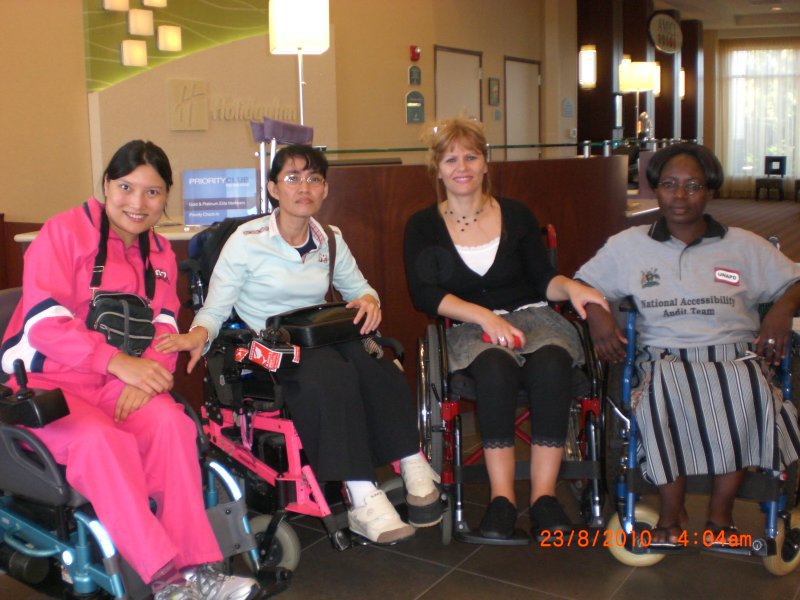
Seinep’s ideas
We have talked about the importance of education and awareness but it is essential to identify the specific solutions that will help to build an inclusive society. Seinep is driven by many great ideas and she wants to be fully engaged in inclusive changes.
“I want to develop such a project where people with disabilities can find themselves in different careers like programming, art, ecology, or journalism. I also want to improve and develop an accurate database. How many people with disabilities go to school? How many of them are girls and boys? What kind of disabilities do they have? Without data, we cannot raise awareness and influence the problem,” explains Seinep.
Seinep wants to build a fully accessible city in which people with disabilities will have all the facilities to visit public spaces and easily use city transportation.
One of the initiatives that have already been implemented is the “Empowering Parents of Children with Disabilities” project which was organized by Nurzhamal Karamoldoeva, Executive Director of the Center for Civic Engagement at AUCA, and conducted in cooperation with Seinep Dyikanbaeva as the representative of the public association of parents of children with disabilities “ARDI”.
“The “Empowering Parents of Children with Disabilities” project’s main goal is to support and empower parents of children with special needs via the development of short informational video modules in four thematic areas: psychological support, communication with one’s child, legal support, and financial literacy.”
Video modules work as a guide for parents who do not have enough knowledge and information about the legal rights of children with special needs or who need to learn in-depth about psychological care and financial literacy. Each module is presented in Russian and Kyrgyz languages.
.png)
Seinep Dyikanbaeva as a legal expert tells about the rights of children with special needs in the video module
.png)
Part from the video module on the rights of children with disabilities in Kyrgyzstan
.png)
Seinep speaks about the importance of protecting the rights of children with special needs
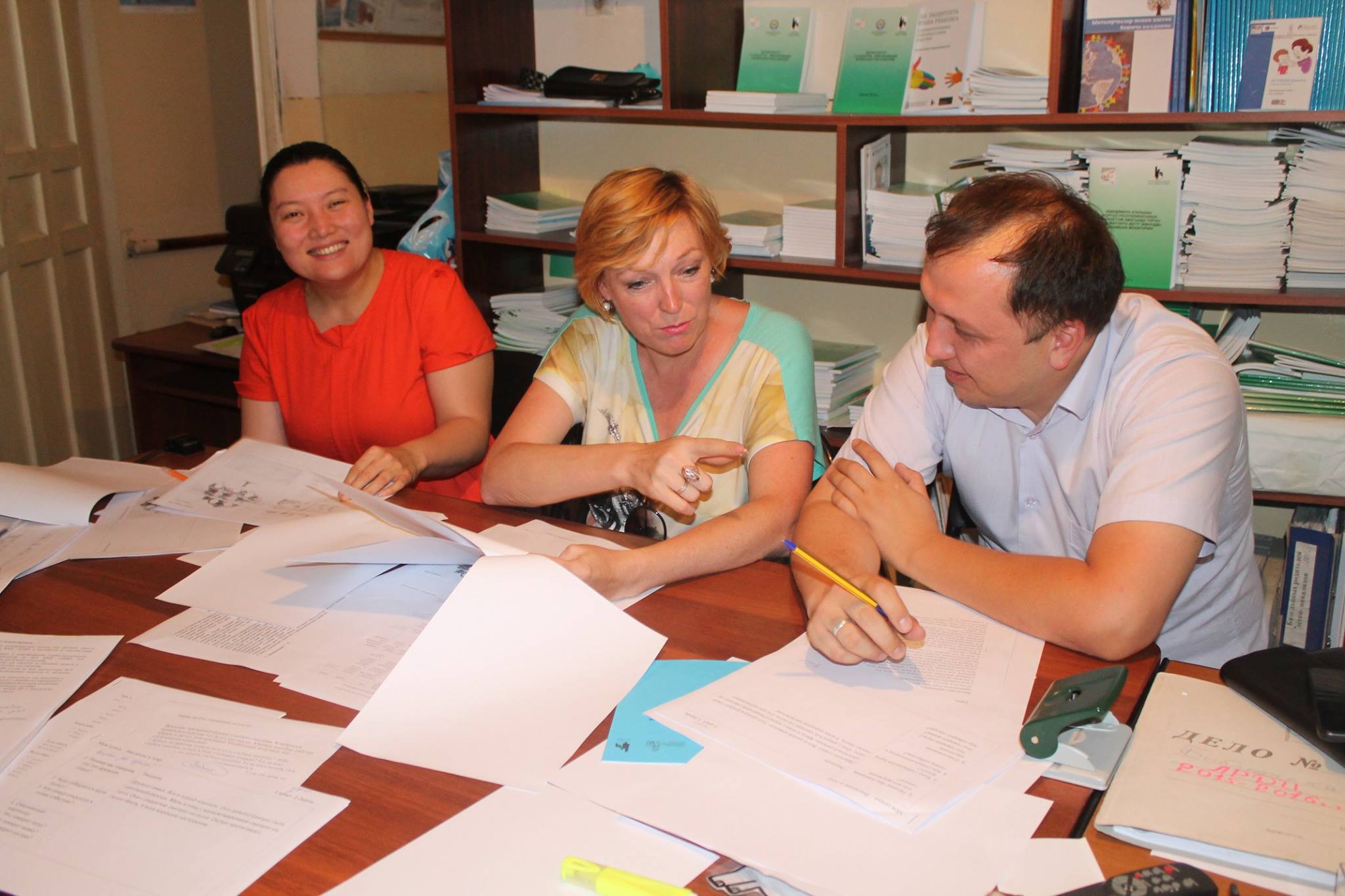
Personal development
We asked Seinep about her character’s development, values, and beliefs.
“I am fearless, I am not afraid of anything. If I would fear something, I would not graduate from AUCA and start working as a lawyer. I think only faith helps me to move forwards, face challenges, and make an impact. If people will work with all the barriers and limitations they have, we would have great progress in society. When you hope for good, hope for success and changes, miracles happen,” says Seinep.
Seinep also shares that she is inspired by happy things and by those who are happy. While engaging with many issues on a daily basis, she loves to enjoy happy moments. She also emphasizes that she likes to see people who became successful and do a huge amount of work for the betterment of our country.
“I like to see the success of people whom I personally know like Askar Sydykov, Saniya Toktogazieva, and Fatima Yakubaeva. I am happy because these people play an extremely important role in our country, they are making a difference,” says Seinep.
In conclusion, Seinep says that she loves to see human potential and she strongly believes that big changes will occur in the near future.
Seinep Dyikanbaeva makes an invaluable contribution to the development of an inclusive society and education in Kyrgyzstan. By introducing conversations about people with disabilities or cerebral palsy, raising awareness about inclusion among the population, and creating equal social participation for all citizens, we can truly magnify meaningful change toward a progressive future for the country.
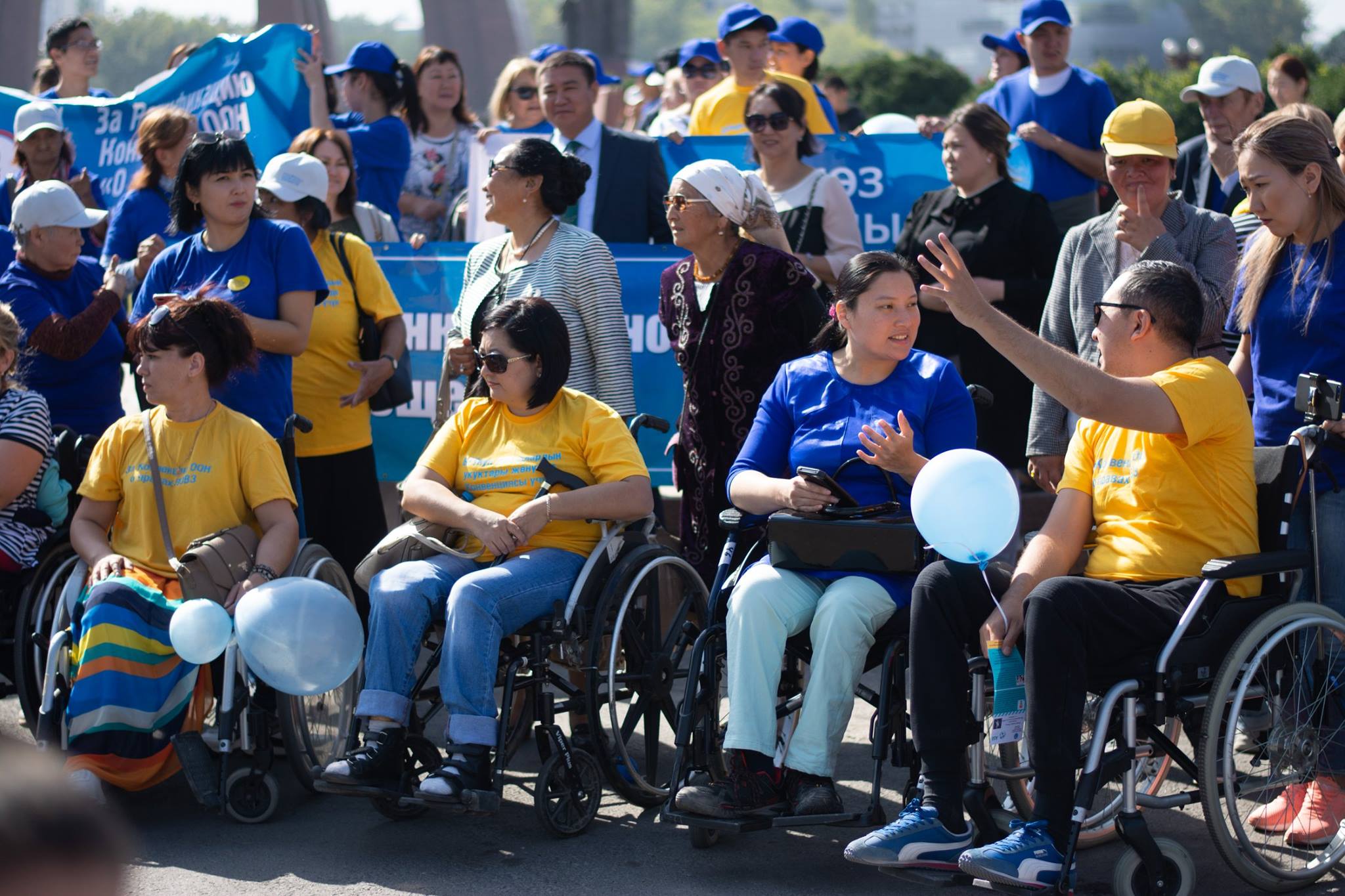
The article was prepared by Salima Almazbekova, sophomore student from JMC department
To learn more about Seinep Dyikanbaeva, please, watch her interview ⬇️
The interview was prepared by Alina Baitokova, junior student from TCMA department
Gender inequality is present in every corner of our country, it seems to seep into people's homes, schools, universities, hospitals, work institutions and unfortunately into the mindset of people who accept inequality as a normalized phenomenon that has a place to exist in society.
Despite reports from government and international organizations on the progress and advancement of women’s rights, we still see women killed by their own husbands, harassed by strangers, denied their right to education and employment, and physically or mentally abused on a daily basis.
Solving the issue of gender inequality, which has been present for many decades, is extremely difficult in our country, but living in a society in which women have to fight for basic human rights and face danger on a regular basis is worse.
To address this pressuring issue, it is first necessary to speak about it, to identify the significance for each citizen and to give the right of voice to each woman in the country. There are a lot of ways of promoting women empowerment and speaking about the issue of gender inequality. Some use diplomacy and law, some use education and science, but the characters in this story use one of the most enigmatic, profound, and aesthetic methods of addressing societal problems – they speak the language of art.
Diana Ukhina, Adele Ismailkhanova, Alima Tokmergenova are artists who use art to transform established horizons, shape existing patterns and raise significant dialogues. With a focus on collages, art therapies, research, ceramics, and exhibitions, they consider art as a critical discipline linking research and artistic gesture, theory, and practice, in which the transition from an object to an event, a process, study, and immersion are important. They work in the art studio for art, research, and design “SYNERGY” where they create a safe space for emancipation and transformation.
Diana Ukhina
Diana Ukhina is a founder of the art studio “SYNERGY”, curator of exhibitions, researcher, and a member of the Bishkek School of Contemporary Art. Diana supervises all the activities of the art studio, conducts research on a variety of topics, and organizes exhibitions and various educational programs on approaches to research the culture and art of Kyrgyzstan. Currently, she finds art exhibitions as one of her favorite types of medium.
Diana actively uses art to speak about gender inequality and attract the attention of society to this issue. For example, together with her colleagues, she made a huge research and exhibition about the emancipation process of Kyrgyz women during the Soviet Union. She also researched the Soviet Kyrgyz journal “Kyrgyzstan Ayaldary” to identify the tendencies of change of women’s place in society in the past. This research was transformed into a journal which was called “Burulai” after the young woman who was killed inside the police station by a stranger in May 2018 in Kyrgyzstan.
We asked Diana what she thought about the overall situation of women in our country.
“We start to set the vector of transformation and it is great that in Kyrgyzstan art is more and more used for this. About the situation – it is complicated. That is why I work on addressing this issue, who better than us women should talk about it and fight against it? Patriarchy in its structure is present all over the world, there are just different dynamics and contexts in which it is realized. And I am also experiencing the patriarchy in my life,” shares Diana.
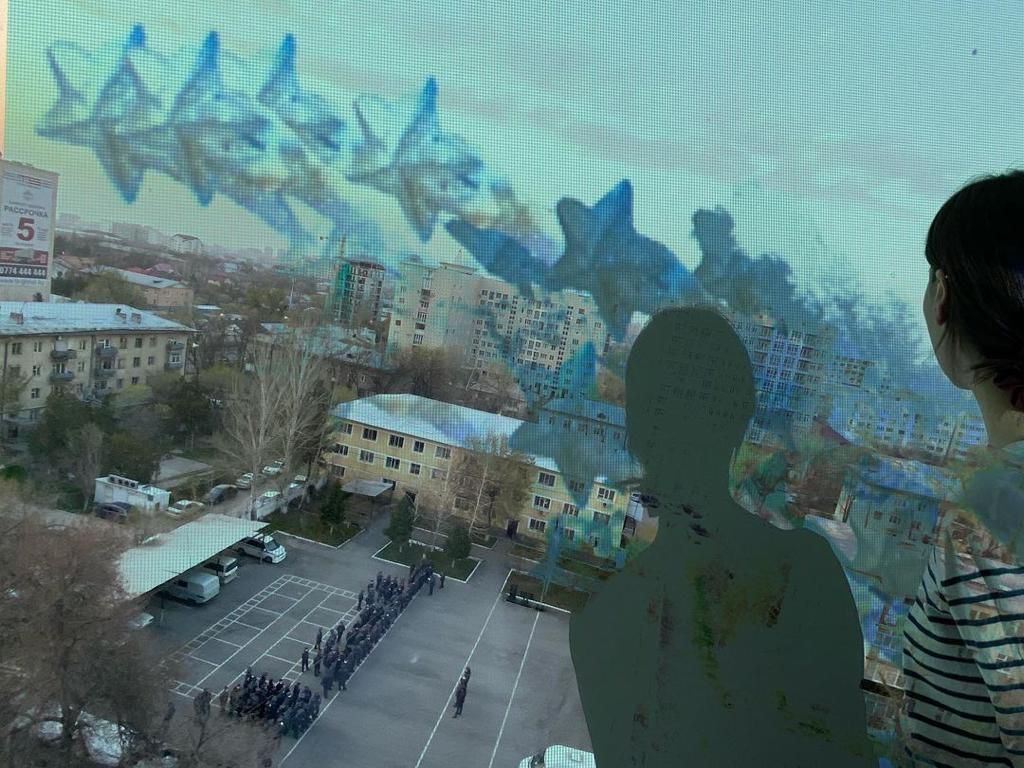
Photo work “I’ll take my power back”
Double exposure, 2020. The exhibition called “Images of Liberation” and Bishkek police station during the COVID-19 pandemic lockdown.
Diana shared that through art and creative work she could emancipate herself which was one of the most significant events of her life. As she explains, that is what they found after exploring the life and art career of women artists of Kyrgyzstan – art is the strongest and most freeing point of emancipation.
“We had many projects conducted in the regions, one of them was in the village of Bokonbaevo. Women there have an art studio based in one of the village houses where women gather to make felt products. It seemed to me that this place is an opportunity for them to get together, feel safe and free,” says Diana.
She shares that the hardest part of societal issues is that our consciousness moves very slowly, the patterns that are formed and become traditions are difficult to change and unfortunately this is built on the construction of the other in a woman. And this other is not equal.
For Diana, it matters that even five people will read her publications or go through her exhibitions. She tries to create different ways for people to immerse themselves in the exhibit – it can be walking, reading, or participating in the art zones.
.png)
Picture from the exhibition called “Images of Liberation”. This exhibition was organized on March 8, 2020 when around 70 activists who came to the peaceful march for women's rights were arrested and delivered to the district police station (https://drive.google.com/file/d/1cqp_YHTvAZW1E9SOF1c8H6Et0AVCY_79/view).
Within the activities of the art studio, Diana and her colleagues do workshops, art therapies where people are encouraged to just come and try different materials and techniques. It is also offered not to try to paint beautifully and perfectly, but to express yourself through any form of creativity. As she says, “If you start practicing art constantly, you start to go beyond the limits, you start to experiment more and then you feel more freedom and that you really have it in you.”
That is why women find art as a way to expand given boundaries and frames that have been set and imposed either by family or society. While practicing art for the first time, women feel that they rule the whole process and they understand that nobody but them decide what are their next directions and moves which is later projected gradually onto life itself. Women also begin to take great pleasure in what they create in art. They can be proud that they could, for example, draw something interesting, knit or create art objects. This brings them joy, goosebumps and pride in themselves, which then becomes an integral part of their lives, as Diana says. And after that, when someone tries to put pressure on them, they confidently resist it.
Diana also shared her view on building women empowerment.
“It is not only about the relationship between a woman and a man, but between a woman and a woman, too. It is about creating relationships with each other out of love, solidarity and support, understanding that you have some kind of common ground on one side of oppression and on the other side you have the opportunity to reclaim the power of yourself. If we come together and support each other, that is the most important thing, you do not feel alone, you feel that you can actually make a difference,” says Diana.
Adele Ismailkhanova
Adele Ismailkhanova is an artist of the art studio “SYNERGY”. She positions herself as a multifunctional artist because she does different types of art such as painting or conducting art therapies. However, currently her main and most favorite medium is collage.
Collage is not a popular medium in our country, however Adele wants to popularize it as she believes that through collages many important stories could be told. This type of medium could be compared to the Kyrgyz traditional form of art called “Kurak '' when women through mosaic sewing, assemble new items from leftover cuttings or even old items. Just like kuraks, collages also bring different pieces together to create something new. Adele thinks that collage has a strong connection to our modernity as we live in the world where everything has already been created and while constructing a collage, we reassemble, tearing and cutting the old to create new meanings which is the part of Adele’s art philosophy.
Adele tells different stories in her collages and she also uses her medium to make a contribution to the development of women empowerment. She feels that the situation of women in Kyrgyzstan is terrible and she strongly believes that even if authorities do not recognize the language of art, it is a great tool to speak and push certain values.
One of the significant experiences of Adele was her work with Crisis Centers where she taught women how to create collages.
“I worked with a group of women in one of the crisis centers and it was very difficult. There are women who got there in different ways. I had to expend a lot of moral energy because women there are deeply immersed in their problems and it is of course understandable. One woman told me not to tear and cut the paper because it was hard for her to break her usual boundaries and open herself to something new. I always look at the group in which I conduct art therapies and I evaluate what techniques to give. In crisis centers it is possible to give not all techniques but I try to slowly and step-by-step interest people, to make them feel good, relaxed and feel safe while doing collages,” shares Adele.
Every year the number of women who are forced to go to the crisis centers because of domestic violence is swiftly increasing. The data below shows a substantial comparison between women and men who went to crisis centers from 2018 to 2021. The huge difference in numbers between the two genders reveals the whole catastrophe of domestic violence and gender inequality against women in Kyrgyzstan.

The following data demonstrates the total number of women and men who faced domestic violence in the same years as was mentioned before. One of the most important factors is that in both graphics we can see that men’s numbers have a good tendency to decrease, while women’s numbers always increase in a very progressive manner.
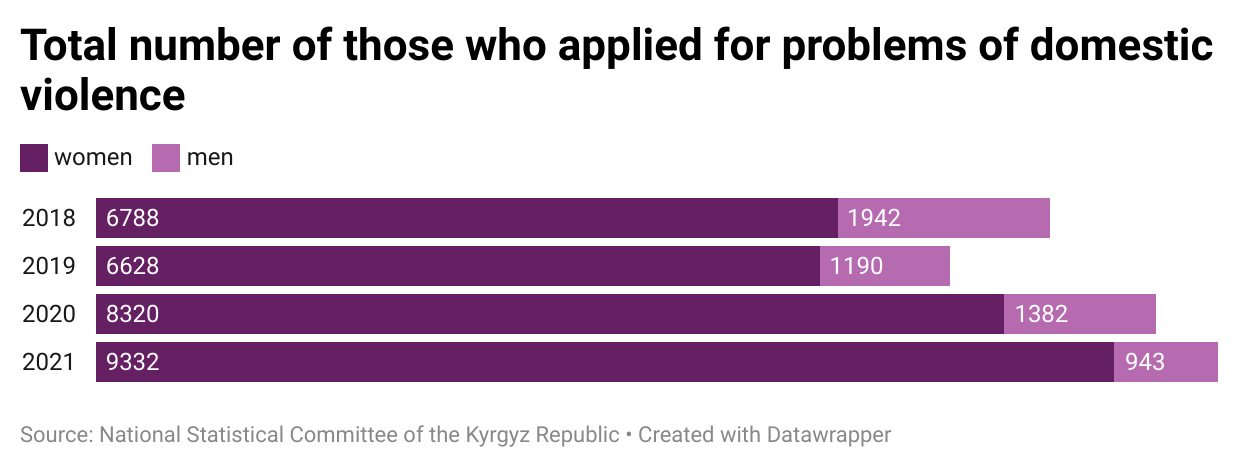
Adele also organized art therapies and usually only women sign up for those workshops. Adele shares that she loves to do social work but she has not understood yet whether it leaves any positive light in the lives of the workshop participants. However, she shares that many women gave her good feedback.
“Some women told me that they started to believe in themselves and realized that they can paint. In general, absolutely everyone can draw and it is vital to remember that creativity and drawing are our basic rights for joy. When people first try to make collages, it is new to them. Tearing up old newspapers, magazines, tearing up old postcards, reassembling and constructing something new – it affects people, positively affects the brain, and a lot of neural connections start to interact,” says Adele.
Adele shares that during the pandemic, it seemed to her that the world was falling apart but art helped her a lot. She explains that art is about the moment. If you do not like it, you can tear it up or crumple it, feel that moment and those emotions, and then throw it away and it doesn't matter anymore. In art you never lie, you can never logically explain why you chose this or that paper, material, or color. This is where the purest, wisest, most sincere, unconscious works appear. You become yourself, that is why we call it art therapy or even meditation because we are left alone with ourselves.
Adele Ismailkhanova’s digital collage.
Adele Ismailkhanova’s digital collage.
Adele Ismailkhanova’s hand cut collage.
Adele says that she tries to focus on solidarity with women as her colleagues are almost all women. She explains that working with women is extremely inspiring as they teach each other, help each other and exchange ideas and skills.
“I think the era of individualism where there is only one master or brilliant artist is gone. Now we have moved to the era of collectivization and solidarization. Yes, we are all in some way geniuses and we have our own values but our strength is that we unite and through unification and teamwork we can make an impact, promote and create,” tells Adele.
Adele shares that the reason for her work with Diana and Alima in the art studio “SYNERGY” is that they feel good together, they have some glue that connects them and they complement each other a lot.
Alima Tokmergenova
Alima Tokmergenova is an artist of the art studio “SYNERGY”. She also considers herself as a multifunctional artist as she does museum tours and city tours of monuments, she loves writing
texts and she also does ceramics and national patchwork called “Kurac”. However, currently her main passion is research of Kyrgyz sculpture artist Olga Manuilova and engraver Lydia Ilyina.
Alima believes that we are slowly moving towards progress on the issue of women’s equality. She says that all women should have access to education in all its forms, including art. Through her work with ceramics, Alima shared with us how art helps women to feel their inner freedom and identify their own values.
“Ceramics and clay are very wonderful tools. When you start to touch the clay, you start to feel the tactility in a different way. You think that you know exactly your next moves but clay starts to behave differently. You wanted to make a cup, however at the end you have a plate because the clay went the other way and you followed it. Important thing here is that you have to trust the process and not resist or fight the clay, you have a joint object together with nature,” shares Alima.
Alima shares that after ceramics workshops, women are surprised that they can actually do art and create different objects. Women of all ages with different backgrounds visit the workshops and say that the last time they did art was when they were in school. Alima says that women come and open themselves, they express their thoughts, feelings and values through art. Some women speak about vital issues through their work as for example when participants talk about women’s rights in their collages or ceramics works.
.png)
Alima during her ceramics workshop.
.png)
Results of the ceramics workshop.
Alima says that in our society often girls are told that art is not a profession and many of them do not know that they for example can study at Kyrgyz State Art School named after. S.A. Chuikov where education is free.
“I think it is important that women have access to creativity because creativity is a basic human need and right. Some women do not realize that they have this right and opportunity and that they can express themselves through it. Once we went to one of the villages of Talas region where we visited the only art studio where little girls had an opportunity to draw and paint. It is good that they have those resources but we need to expand them and try to give these opportunities to each girl,” says Alima.
Through research of the Kyrgyz sculpture artist Olga Manuilova and engraver Lydia Ilyina, Alima raises awareness about female artists of Kyrgyzstan and inspires readers by their outstanding work. Olga Manuilova was one of the first in Kyrgyzstan which was difficult for her as there were no schools and she did not have enough support. Lydia Ilyina is the ancestor of Kyrgyz graphics, engravings, linocuts. Alima says when people read her research about these two powerful women, people are surprised that they could start doing art when there were no women doing that before.
Alima is very inspired by the female artists from the past because not many people know them and at least their names which is the main reason Alima tries to talk more about them.
“By doing what we do, we create a space where different people can come and experience something new and do it together with other people because communication creates a specific atmosphere. We create a place where people can exchange energy and ideas,” tells Alima.
Alima also thinks that with Diana and Adele, they compliment each other and that she is inspired by the work of her colleagues and female friends.
**********
Each of these characters has their personal stories of acquaintance with art and they, like all of us, have their own prism through which they create and explore its different and interesting forms. Diana, Alima, and Adele work as a single mechanism, complementing and supporting each other. Working in the art studio "SYNERGY", they create a space in which everyone can reveal his or her true self and feel the patterns of their inner emotions.
Through different art forms, they empower women by showing them how to go beyond the limits of what is allowed and transform towards freedom and personal values not succumbing to pressure or judgment. We interviewed our heroes individually, revealing their unique personal stories and views. However, each of them delivered a message that accurately describes the uniqueness and power of their work. Despite the variety of the art forms they use, each of them sees and feels art as a unique language which builds gentle dialogues that help gradually address and hopefully solve the most critical societal issues such as gender inequality.
Web-site of the art studio “SYNERGY”: https://ci.kg/about
Link to their publications: https://ci.kg/press
Their contacts: laboratoriaci@gmail.com
The article was prepared by Salima Almazbekova, sophomore student from JMC department
To learn more about "SYNERGY," please, watch the documentary ⬇️
The documentary was prepared by Alina Baitokova, junior student from TCMA department
Omar Dairov
How often do we think about ways of making a positive impact on our home communities? And how often do we actually implement our ideas and make our plans happen? The answer to these two questions can be different, however, one thing is for sure – sometimes we tend to doubt ourselves and are afraid to take action even if we have great opportunities for that.
The story of Omar Dairov, an executive director of the public organization of students of Kyrgyzstan for a green economy "Jerdin Baldary" shows that even with insufficient resources and opportunities, but with great passion and desire, it is possible to implement an idea that will eventually have a large-scale impact on the society and in the case of Omar, on our environment.
“Jerdin Baldary”
"Jerdin Baldary" is an organization that contributes to the development of Kyrgyzstan according to the principles of the "Green Economy" and unites the efforts of all students and progressive-minded youth for the sustainable prosperity of our Motherland.
This organization was created to study and exchange ideas of modern world development on the issues of "Green Economy", climate change, and environmental problems in general, and based on such study and exchange, to contribute to the training of young professionals on whom the future of Kyrgyzstan depends.
In other words, it is a large community of bright leaders across the whole country who make their contribution to the development of our environment. One of the main activities of the organization is tree planting. “Jerdin Baldary” has organized a large number of projects where students have planted around 70 000 trees in each region of the country.
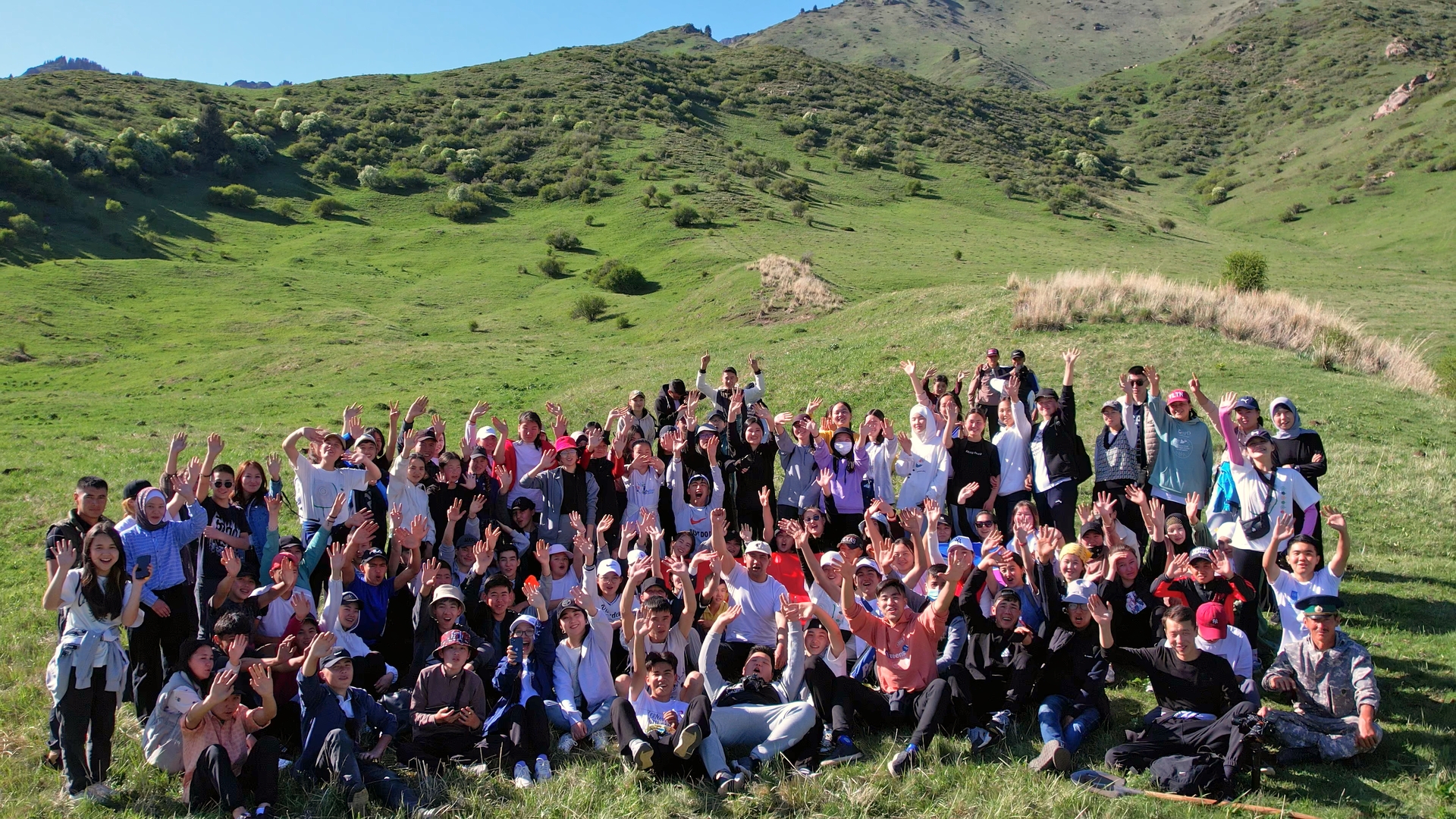
Participants of the “Jerdin Baldary” movement during the environmental activity.
Process of tree planting in the Naryn region.
Moreover, they organize environmental conferences, festivals, and workshops that help to inform the local citizens about ecological issues and climate change. They regularly arrange forest plantations, ecological camps, community work days, and other useful activities. This is not just an organization to promote environmental issues, but it is a huge association of young leaders of the country who care about the future of Kyrgyzstan. Of course, looking at the activities of “Jerdin Baldary”, one can understand how large-scale this organization is. However, it is important to mention that the organization did not achieve such a scale immediately, and its founder began this activity without any valuable resources or funding. Therefore, we will find out the personal story of Omar Dairov.
Story of Omar
Omar is 22 years old, he graduated from Kyrgyz Russian Slavic University and now he is pursuing his master's degree in Almaty, Kazakhstan. An important part of Omar’s story is his childhood. He was growing up in the village together with his grandmother who always taught him rural affairs.
“You get up in the morning, look after the cow and feed her with grass. After that, you go to the garden, dig up potatoes to prepare for the winter, and do the same in spring to prepare for summer. At this age, my grandmother and my uncle taught me how to work with the soil, with machinery, with a hammer, screwdriver, and shovel. I think, exactly at that time, my practical skills for caring about nature were established,” shares Omar.
Later Omar lived with his mother because his parents were divorced. However, Omar got a chance to reconnect with his father when he was 11 years old and it was one of the turning points for Omar. He could build a strong connection with his father who introduced the divine world of nature to Omar. His father who is an ecologist played a key role in the development of Omar’s character and his future.
“After resuming communication with my father, he began to teach me spiritual and philosophical things related to ecology, nature, and environmental protection. In general, my father revealed to me a huge, unknown world of nature. I realized for myself that I would dedicate my life to protecting nature and developing my country. Before meeting with my father, I did not think about my goals and plans for my future. He became an important figure in my life who was able to guide me on the right path,” says Omar.
Therefore, the key figures in building a love for the environment were Omar's grandmother and father, who gave him the necessary knowledge during childhood. Omar's mother and his sisters and brothers also were significant people who always supported him.
First steps
When Omar started to study at the university, he thought a lot about how exactly he could help the environment because he was a grown-up who could finally realize his ideas into reality. At some point, Omar and his friends got acquainted with the concept of the Green Economy. They began to research this concept, attending all possible conferences and lectures and spending sleepless nights together to achieve their goals.
“We started to develop network connections, communicate with experts, and fully delve into this topic. During this period, an understanding of the Green Future of Kyrgyzstan was born and we were excited about it. My friends supported me and we had the same vision about our future,” shares Omar.
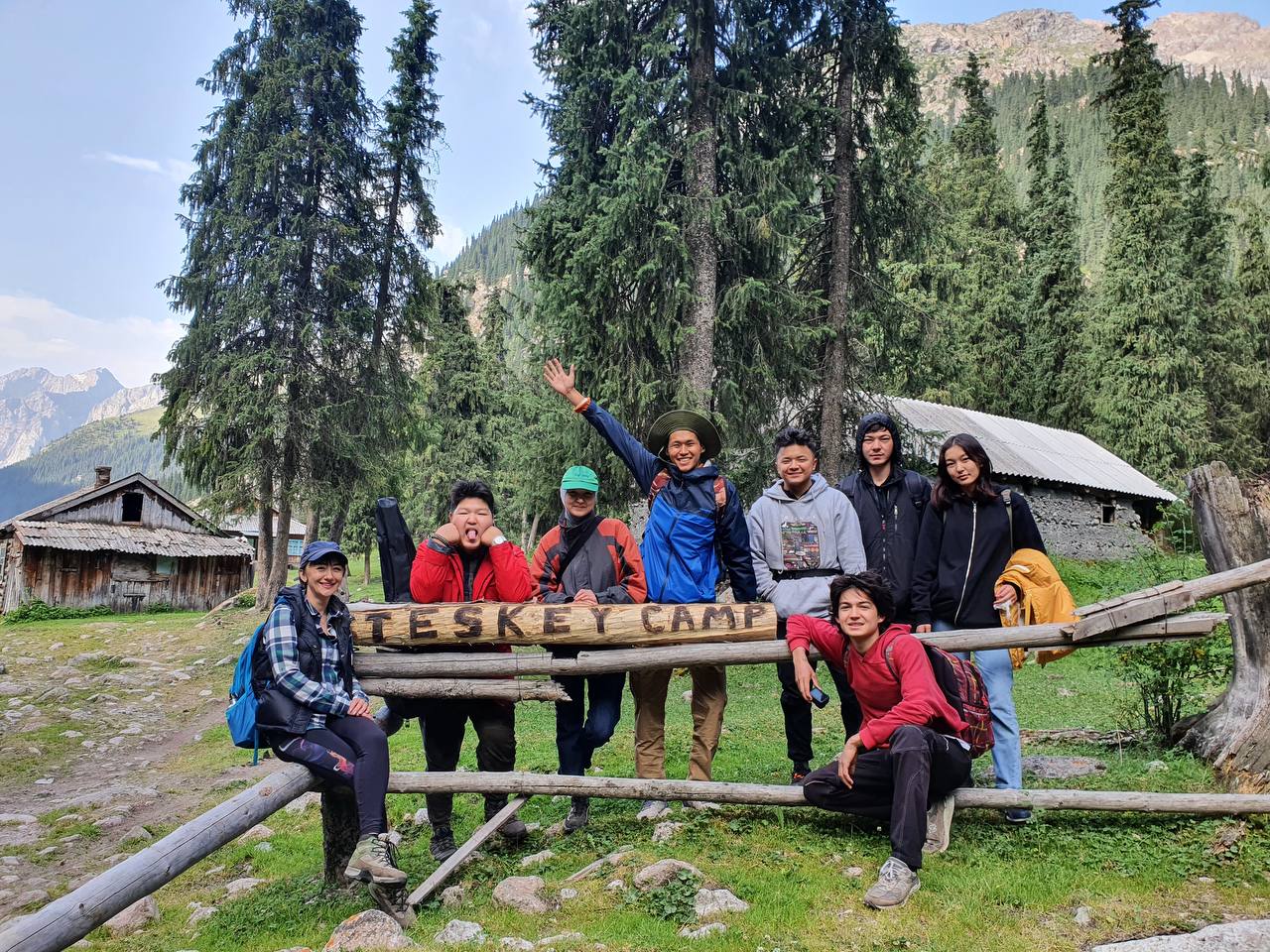
Omar and his team at an altitude of 2600 meters above sea level, in the Tien Shan Alpine Scientific Center.
From the very edge, Zoya Kretova, leading climatologist of Kyrgyzstan.
The first project that Omar and his friends implemented was an educational project which aimed to tell people about the Green Economy. They invited professionals who gave interviews and talked about political ecology, the model of Kyrgyzstan’s development, and how to inform people about environmental issues. But what is more important here is that the team created this project with their funds without any sponsorship. They bought the cheapest camera and were learning how to edit videos by themselves.
After the first project, Omar’s team started to learn how to write projects and financial proposals, how to promote their ideas, and build strong informational content. They were working hard and mostly learned everything by themselves. It was hard at the beginning as they were new in this field, however, their dedication and persistence helped them to reach their goals.
Then their success began to break through. They were able to organize the first Youth Climate conference in Kyrgyzstan, find good support from various organizations, and most importantly, they were able to build relationships with the young people living in the regions of our country.
We asked Omar about the fundamental elements of eco-activism. He emphasized that the foundation of it is always enthusiasm, initiative, and a huge desire.
"Eco activism and love for nature are much deeper and more meaningful than a simple shopper and an eco bottle. Eco culture always implies a love that comes not from the mind, but from the heart. If you have a commitment to an idea and a desire for a better future for the country, then the whole world will support you.” says Omar.
We were also interested in how Omar gathered a team of like-minded people who were able to implement so many small and large-scale projects.
“All the people in the team were those who were ready to spare no effort and energy for a brighter future. They were the ones who very much wanted to learn and contribute without the intention of making money from it. They were driven by love and aspiration, which are still the fundamental qualities of our team,” explains Omar.
Work with youth in the regions
“Jerdin Baldary” works mostly with young people that live in the regions of Kyrgyzstan. Omar explains that his initial goal was to inform and develop the understanding of environmental issues in the regions because people are different there in comparison to Bishkek youth for instance.
He says that people there are not privileged at all, while students in Bishkek have endless opportunities and resources. Omar understood well how life went in the regions and he had a strong desire to make a difference. He told us that youth in the regions want to help Kyrgyzstan and they are eager to do anything that can positively affect the future.
“We immediately chose our audience – students who do not have many opportunities. We believe that by teaching these students, we will be able to build a foundation for the development of our country. Lack of access to information among regional students became the reason that we wanted to work with these young people. We wanted to help them a lot because we did not have enough resources and opportunities. However, we were lucky that we lived in Bishkek and were able to find the resources and access to the necessary information ourselves. But everything is different there, and we wanted to bring down this big parallel between rural and urban students."
“You will see how students in the regions have burning eyes, love, aspiration, and a flow of energy. They are very grateful and diligent and this is our main motivation.”
With one small initiative and idea, a significant and large-scale project can be established. To make the first steps in making an impact on society, you only need desire, passion, and love which come from the bottom of your heart, in other things, as Omar said, "the whole world will support you."
The article was prepared by Salima Almazbekova, sophomore student from JMC department
To learn more about Omar and his experience, please, watch the documentary ⬇️
The documentary was prepared by Alina Baitokova, junior student from TCMA department
Student Civic Engagement: A Pathway to Active Citizenship
Civic engagement refers to the active participation of citizens in activities that help to strengthen the society, bring changes for the betterment of the community and address social, economic, and political issues. Each person can become an active citizen however civic engagement among university students is a cornerstone of the thriving community as they represent the future generation of leaders. When students implement social projects, they feel a strong sense of community and a necessity to bring changes with far-reaching implications. However, how do students from different countries with challenges such as authoritarianism, lack of quality education, economic constraints and external, political influences take initiative on civic engagement projects with a huge impact? We discover the stories of active students of the American University of Central Asia from Afghanistan, Kyrgyzstan, Uzbekistan, Tajikistan and Kazakhstan who have been successful in addressing the issues that matter most to them for deep and personal reasons.
Zainab Amirzai, senior student, Afghanistan

Zainab Amirzai.
Zainab Amirzai, a senior student of the American University of Central Asia from Afghanistan, was leading a civic engagement project which researched the lives of Afghan immigrants in Kyrgyzstan. After the Taliban seized control in Afghanistan, many Afghan families were forced to leave their homeland, move to different countries and adapt in new environments. Zainab and her teammates interviewed Afghan families living in Osh and Bishkek cities to know more about the challenges they face every day in the new country. The final outcome of the project was presented in the form of the documentary and academic journal article.

Zainab Amirzai on the left.
Zainab shares that civic engagement for her is not just a concept but a responsibility and privilege to actively participate in the society, speak on issues that matter and be part of the bridge between the citizens and the government while reflecting the collective will. She believes that civic engagement helps her to foster her leadership and management skills, learn how to easily adapt to new environments and overcome different challenges. Civic engagement for her is not only about big projects but also about kindness and willingness to give back to the people around.
“Being a part of civic engagement activities is a social responsibility, does not matter how big or small your action is, every action counts. It could be volunteering in different organizations, helping your group mates with assignments, helping elderly people – every action counts”, says Zainab.
Zainab feels like she is a civically active citizen because through her projects she builds a strong connection with the community and contributes to the most pressing issues.
Masuma Makhamadalieva, senior student, Uzbekistan
Masuma Makhamadalieva.
Masuma Makhamadalieva from Uzbekistan is a senior student of the Television, Cinema, and Media Arts department at AUCA. Together with Zainab, Masuma was also researching the lives of Afghan refugees in Kyrgyzstan. In the project, she worked as a camera operator and translator during the interviews of each member of different Afghan families residing in Osh and Bishkek cities.
Civic engagement for Masuma is a sense of duty to analyze the problems that make society suffer and find different outcomes that can contribute to the solutions to these problems. Masuma believes that civic engagement is especially important for young people because they are becoming strong members of society with great opportunities to share their knowledge and benefits with those who need it most.
Masuma shares that before the project, she did not fully realize the depth of Afghan immigrants’ struggles, she was shocked to hear stories of daily discrimination cases. Through the documentary, Masuma and her teammates hope to reach out to the authorities who can help Afghan people with different issues like the inability to recover their passports.

Masuma Makhamadalieva is taking an interview during the project.
Masuma also feels a strong connection and necessity to bring change in her home country. She feels a strong sense of civic responsibility and believes that through her projects, she can address the issues that matter to her.
“I am a student from Uzbekistan and there are a lot of social problems and the biggest one is a problem with education. Not everyone has access to quality education and as a privileged girl from Uzbekistan, I have a strong sense of duty to help my community and show the youth all the opportunities they have. That is why civic engagement is vital because it is a way through which I can do that,” says Masuma.
Saliya Khurova, senior student, representative of the Dungan minority in Central Asia, originally from Kazakhstan

Saliya Khurova.
Saliya Khurova, a senior student of the Journalism and Mass Communication department, is a representative of the Dungan minority in Central Asia and is originally from Kazakhstan. Saliya was a UNICEF volunteer, a president of the AUCA volunteering club and a project manager of the “Basketball for All” civic engagement project.
Civic engagement for Saliya is more than just an activity, it is one of the most important parts of her life as she not only helps the community but also tributes the memory of the close person and reaches a strong personal growth through her commitment to civic engagement.
Behind the interest in engaging in the “Basketball for All” which is a project for creating an inclusive world for children with disabilities and other diseases was Saliya’s grandfather. He was a doctor and spent half of his life treating children with disabilities, autism, down syndrome and other neurological diseases.
“During COVID 19, he passed away and he could not see my success in this project. Everything I did was in memory of him and I imagined what he would say to me and how proud he would be,” says Saliya.

Saliya Khurova during the “Basketball for All” project.
Saliya shares that civic engagement greatly contributes to personal growth as she learnt how to lead projects, organize events, conduct negotiations and work with financi онal papers. At the beginning Saliya had a fear of public speaking and she was worried about time management, however as she says, “I could do it all, so less fear, more love, just do what your heart tells you to do”. Saliya advises everyone who wants to begin their civic engagement journey to never be afraid of asking for help, manage time wisely and work only on something you are passionate about.
Saliya is also proud to be a civic engagement activist and represents her minority.
“As a representative of the Dungan minority of Central Asia, I am really proud that I could take leading positions in different projects. I really want other Dungan boys and girls to follow my steps, take the lead, and take the initiative for civic engagement projects. I want them to understand that they are also capable of taking responsibilities of being leaders and still take actions even being a part of the minority.”
Nurbolot Piridinov, sophomore student, Kyrgyzstan

Nurbolot Piridinov.
Nurbolot Piridinov from Kyrgyzstan is a sophomore student of the software engineering department at AUCA. Nurbolot started his civic engagement journey when he was studying at the New Generation Academy where he engaged in different projects and realized the specific issues he wanted to address in the future projects. Nurbolot became passionate about helping high school students in the Batken region where he is originally from. He implemented several projects which were focusing on education as for example the “Digital Literacy” project where Nurbolot and his team were teaching high school teachers in Batken how to use digital tools.
Civic engagement for Nurbolot is a chance to make a difference in the field of education which he started to analyze and observe in high school. He shares the moment after which he realized that he wanted to connect his projects to the issue of low education in his home region.
“Civic Engagement for me is to help others, especially high school students. As a resident of the Batken region, I know that the level of education is low there because after graduation many students from my school went to Moscow to work as immigrants there. It was very sad for me and I felt that I wanted to help them. After that, I realized that I want to show high school students the opportunities of education and how education can help them in reaching their goals. I want them to recognize the significance of education in their lives. They can become good citizens and a good example for each other. I want to be a role model for them,” says Nurbolot.

Nurbolot Piridinov during the “Digital Literacy” project in Batken region.
Nigina Zoidboeva, freshman student, Tajikistan
.png)
Nigina Zoiddboeva.
Nigina Zoidboeva, a freshman student from Tajikistan is a founder of the “She can” project which helps girls from Central Asia in applying for exchange programs abroad.
Civic engagement for Nigina means being an active citizen and as for university students it is an opportunity to get real world experience and develop soft skills. She also believes that while engaging in civic engagement, it is important to build a good network of people with the same values and interests as you. For example, during her exchange year in the United States of America she met many people from around the world with whom they still support each other despite the distance. Nigina also finds civic engagement as a chance to help her home country and her community.
“For me, as for the Tajik girl, civic engagement is helping girls from my hometown in order to get a better education and study abroad. Even if right now I am away from home, I am trying to organize different conferences and online workshops for them. I am telling them about US exchange programs, about studying at AUCA and I also assist them during the application process. Civic engagement means providing education for girls in Tajikistan,” says Nigina.
She also shares the fears she had at the beginning of her journey and how she overcame them.
“Being engaged in social projects requires you to communicate with people a lot. At the beginning, I did not have good communication skills. That is why when I would approach someone to help, I was really shy and it was a big challenge for me. To overcome this, I realized that I need to be more confident. When I started doing this, I realized how many people are interested in my projects and how many people are willing to help me. I advise everyone not to be afraid to approach people and ask them for help and collaboration.”
.jpg)
Nigina Zoiddboeva.
—--
The engagement of these inspirational young leaders extends far beyond the classroom and leaves a huge impact on different communities. Student civic engagement is not just about society but also about the journey of self-discovery. It fosters critical thinking, problem solving and leadership abilities while also enhancing the values of responsibility, justice and social consciousness. Zainab, Masuma, Saliya, Nurbolot and Nigina have chosen to apply their learning to real-world challenges and address the issues that matter to them personally. It is important to note that each student, regardless of age or circumstance, has the potential to make a difference and become a civic engagement leader.
***********
